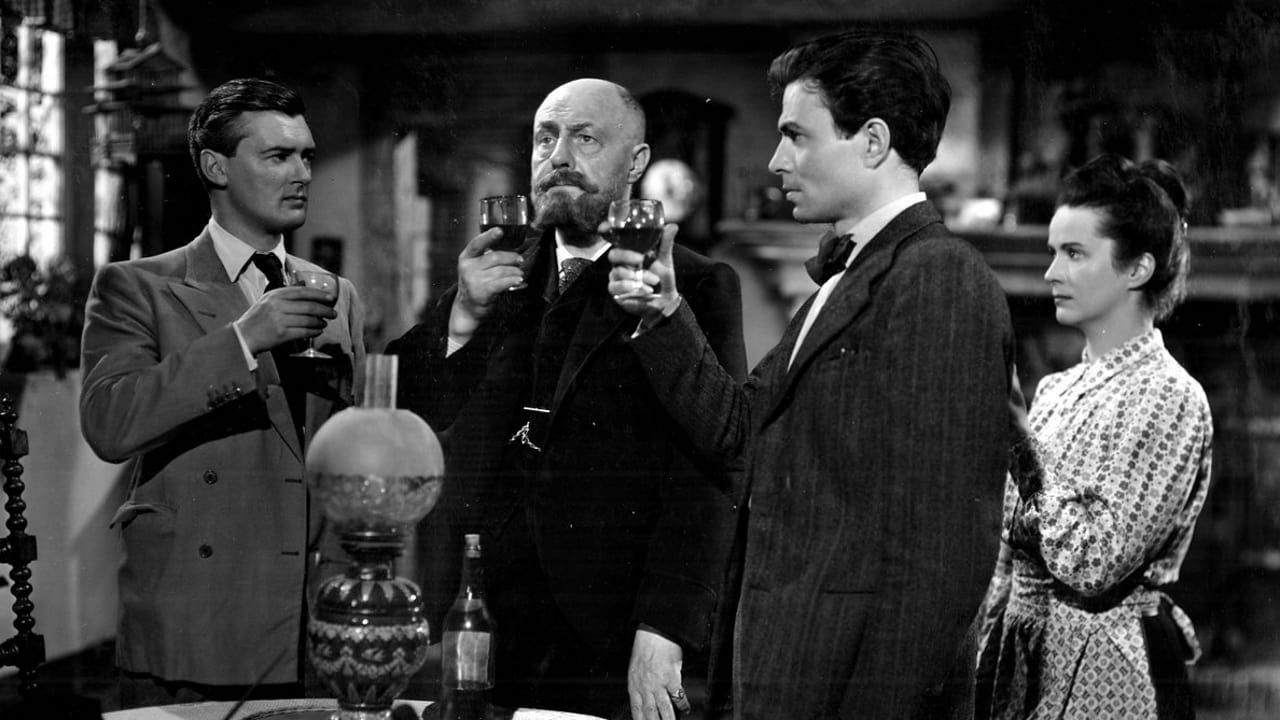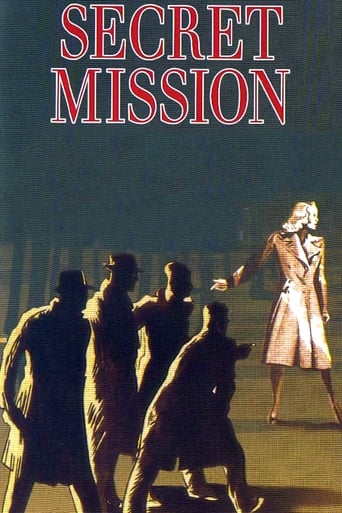



Best movie of this year hands down!
It's entirely possible that sending the audience out feeling lousy was intentional
View MoreGreat example of an old-fashioned, pure-at-heart escapist event movie that doesn't pretend to be anything that it's not and has boat loads of fun being its own ludicrous self.
View MoreThere is, somehow, an interesting story here, as well as some good acting. There are also some good scenes
View MoreDuring WWII, Hollywood made hundreds of films aimed at solidifying the public's support for the war. Some of these were extremely well made while others often made the Japanese or Germans seem semi-human and rather stupid. These less well made and less realistic films often were, in spire of themselves, quite entertaining...but also very obvious in their aims. When I saw "Secret Mission" I realized that the British, too, could make ridiculously unrealistic propaganda films....and while the Nazis aren't quite as cartoonish as some of Hollywood's Nazis, they were incredibly stupid...so stupid you wonder how they ever took over most of Europe!!The story involves some British spies as well as one French one (James Mason of all people) who sneak into France in order to survey the area before an upcoming invasion. The Nazis are uniformly dim...having very lax security and falling for pretty much every lame attempt at subterfuge! The Germans are SO dumb that it really takes away from the movie...and doesn't show how efficiently evil they really were!So is it any good? Well, it's not terrible...not that this is a glowing endorsement! Overall, despite some very fine actors (such as MIchael Redgrave, Herbert Lom and Roland Carver), a relatively dull offering...one that is watchable but not much more.
View MoreHugh Williams (Peter Garnett), Carla Lehmann (Michele de Carnot), James Mason (Roul de Carnot), Roland Culver (Red Gowan), Michael Wilding (Nobby Clark), Nancy Price (Violette), Percy Walsh (Fayolle), Anita Gombault (Estelle), David Page (René), Betty Warren (Mrs Nobby Clark), Nicholas Stuart (Captain Mackenzie), Brefni O'Rorke (Father Jouvet), Karel Stepanek (Major Lang), F.R. Wendhausen (General von Reichmann), John Salew (Captain Grune), Herbert Lom (medical officer), Beatrice Varley (Mrs Donkin), Yvonne Andre (Martine), Stewart Granger (Sub-Lieutenant Jackson).Director: HAROLD FRENCH. Screenplay: Anatole de Grunwald and Basil Bartlett — from an original story by Shaun Terence Young. Director of photography: Bernard Knowles. Special effects: Percy Day, Desmond Dickinson and John Mills. Music: Mischa Spoliansky. Art director: Carmen Dillon. Editor: E. B. Jarvis. Supervising art director: Paul Sheriff. Camera operator: Cyril Knowles. Still photographs: Jack Dooley. Production manager: Tom White. Assistant director: W.N. Boyle. Sound supervisor: A.W. Watkins. Sound recording: John Dennis. Western Electric Sound System. Made with the co-operation of the Ministry of Information, the War Office, and the Air Ministry. Producer: Marcel Hellman. A Marcel Hellman Production. An Excelsior Film.Copyright 4 January 1945 by English Films, Inc. U.S. release through English Films: 26 September 1944. No recorded New York opening. U.K. release through General Film Distributors: 5 October 1942 (sic). Australian release through G-B-D/20th Century-Fox: 3 June 1943. 8,542 feet. 95 minutes.SYNOPSIS: Three officers and a private from British Intelligence are landed in Occupied France.COMMENT: A bizarre mixture of straight spy suspense and lowbrow comedy. Fortunately as the plot progresses, Michael Wilding's comic Cockney disappears for long stretches, allowing the more suspenseful elements to take hold in between the usual unlikely bouts of romance. On the whole, thrills win out. Good production values help. The photography is especially attractive. On the debit side, Mason's fans are not going to be happy either with their hero's tiny part or his ridiculous French accent. It's the far less personable Hugh Williams who steals most of the footage.
View MoreThey are all in it, James Mason, Michael Wilding, Hugh Williams, Stewart Granger and even Herbert Lom as the one German officer who is not a complete caricature, and the glorious ingenious music adds to the general flavour of good humour and fresh spirits, which was needed in the darkest year of the war, 1942. It's war propaganda, of course, but not as daft as it looks from the start. There are some excellent scenes, and you don't always hear James Mason with a French accent complaining about English food in preference of the French kitchen. There are a number of bottles in the film, and some are even opened, but the only wines served is the champagne for the Germans. James Mason is about to relish a well preserved bottle of Calvados hidden from the Germans when the party is interrupted by an unnecessary argument. It all ends up with some real banging and bombing in the end, when the Germans really are blowing it, providing a grand finale, raising the film from a trifle to some interesting entertainment. The best scene is the exciting moment when Michelle is listening to the British broadcast and the Germans barge in just in the right moment when Hitler is speaking - but only as an example of German propaganda shown by BBC, but the Germans leave Mademoiselle with respect and full of admiration for her German loyalty.As an entertainment it's well worth seeing, and James Mason never fails to make any film he is in interesting enough to keep you awake all the way.
View MoreAn impressive cast: James Mason, Michael Wilding, Stewart Granger, Karel Stepanek, inter alia. And that's about it for the good parts.Even the cast can't lift this wartime espionage thriller above the routine. James Mason is a splendid actor but should have stayed away from any role calling for a foreign accent. In "The Desert Rats" he mangled German. Here he does to a French accent what the Luftwaffe did to Stalingrad.Michael Wilding sounds positively uncomfortable with his working-class London locutions. Karel Stepanek, who made virtually a career out of playing Nazis, at least SOUNDS right but the role seems to have come by way of a cookie cutter. What a stereotype. I can't blame the writers too much, though -- this being written in 1942, a bad year for the Allies.Let's say this is an historical curiosity. The future held better things for most of the people involved in this low-budget thriller.
View More